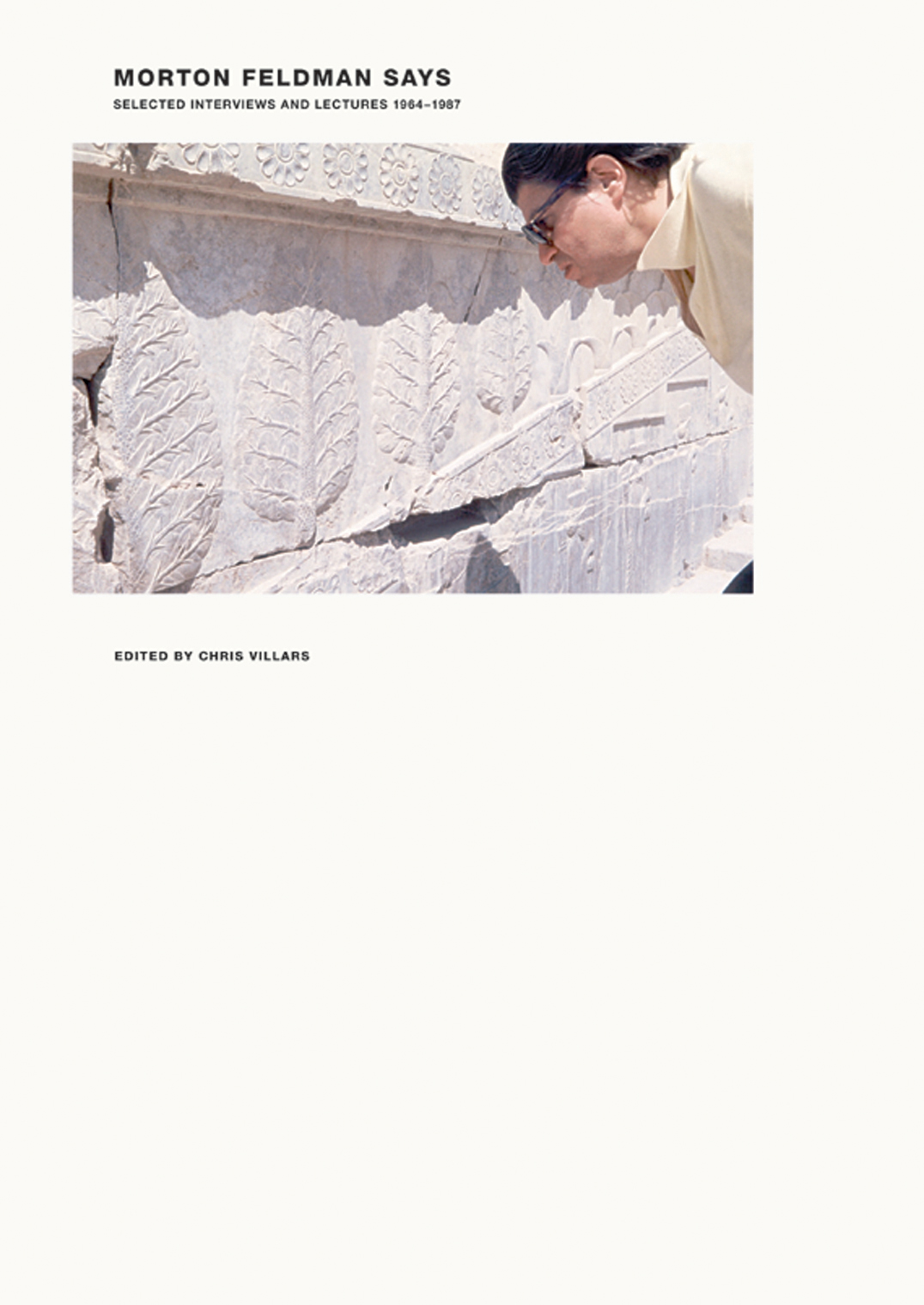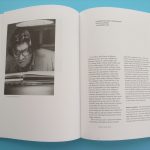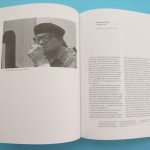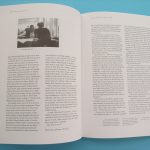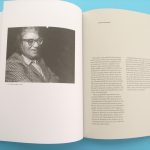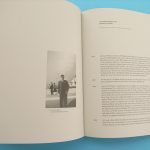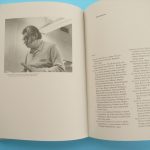This is a book of thinking aloud – about music, about art, about making work, about life. Feldman was a wonderful talker, and much of the qualities of his conversation are captured in this book, both in its text and in its photographs. The book is essentially a documentary, with something of the same spirit as our Anthony Froshaug.
Contents
Introduction (Chris Villars)
Acknowledgements
Interviews and lectures:
1. An interview with Morton Feldman (Robert Ashley), August 1964
2. Feldman explains himself (Peter Dickinson), April/May 1966
3. An interview with Morton Feldman (Jolyon Laycock and David Charlton), May 1966
4. International Times interview (Alan Beckett), November 1966
5. Remembrance (Tom Johnson), 1967–9
6. Morton Feldman – waiting (Martine Cadieu), May 1971
7. The brink of silence (Richard Bernas and Adrian Jack), June 1972
8. Morton Feldman talks to Paul Griffiths, August 1972
9. Conversation between Morton Feldman and Walter Zimmermann, November 1975
10. Studio International interview (Fred Orton and Gavin Bryars), May 1976
11. Beckett as librettist (Howard Skempton), January 1977
12. Pie-slicing and small moves (Stuart Morgan), autumn 1977
13. Soundpieces interview (Cole Gagne and Tracy Caras), August 1980
14. Conversation about Stefan Wolpe (Austin Clarkson), November 1980
15. H.C.E. (Here Comes Everybody): Morton Feldman in conversation with Peter Gena, January 1982
16. Toronto lecture, April 1982
17. An interview with Morton Feldman (Jan Williams), April 1983
18. Johannesburg lecture 1: Current trends in America, August 1983
19. Johannesburg lecture 2: Feldman on Feldman, August 1983
20. Morton Feldman in conversation with Thomas Moore, November 1983
21. Morton Feldman: conversation without Cage (Michael Whiticker), July 1984
22. Darmstadt lecture, July 1984
23. Conversation with Morton Feldman (Kevin Volans), July 1984
24. Captain Cook’s first voyage (Richard Wood Massi), March 1987
25. The note man on the word man (Everett C. Frost), March 1987
Score examples
A Feldman chronology (Sebastian Claren)
Bibliography
Notes on contributors
Index
Synopsis
Feldman is now widely recognized, alongside John Cage and Edgard Varèse, as one of the foremost American composers of the twentieth century. Despite his reputation, he remains poorly represented in published literature.
Feldman loved to talk. This lifelong passion is demonstrated in the many interviews and lectures Morton Feldman gave about his life and work. Over the past seven years, editor Chris Villars has collected and published many of Feldman’s interviews online, a selection of which is now available for the first time in this book.
The book is certainly an important addition to the literature of Feldman. Morton Feldman says can also be enjoyed for the pleasure that Feldman’s words offer, and for the illumination that they give to anyone who is making work in art or design. In this way it is an appropriate start to Hyphen New Series, within which it is published.
Morton Feldman says features 21 interviews and notes on conversations spanning 23 years of Feldman’s life, including conversations with Gavin Bryars, Kevin Volans, and Walter Zimmermann, as well as transcriptions of four of Feldman’s lectures, held in Toronto (1982), Johannesburg (1983), and Darmstadt (1984). The publication also contains an introduction by the editor and the first English translation of Sebastian Claren’s biographical notes (originally published in Neither: Die Musik Morton Feldmans). A key element in the book is the photographs from Feldman’s life, which provide a rich accompaniment to the text.
Reviews
Morton Feldman appreciated fine things – great paintings, good food, attractive companions – and I suspect he would have enjoyed this latest addition to the Feldman fan’s library as much for the tactile and visual pleasure it gives as for its record of his verbal gifts. Since 1997 Chris Villars has edited the Morton Feldman web-page, but useful as that is as a source of Feldmania there is something so much more satisfying about having material from the site in book form. Hyphen Press approached Villars with the idea of such a book and the result is a celebration of the subtle arts of book construction. 240 pages of essays, interviews and lectures, interspersed with photographs, are printed on white paper; then there are 12 pages of score extracts from across Feldman’s output, one piece to a page, followed by a chronology of the composer’s life, a bibliography, notes on the contributors and a good index, all printed on grey paper. The book is paper-backed and beautifully bound, with a colour photograph of Feldman, intently examining an antique relief, on the front of the book jacket.
Does this matter? For a book about Feldman I think it does. He was after all a composer who said ’I’d stop writing music unless I had a beautiful piano’ and elsewhere that ‘pitch is a gorgeous thing. If you have a feeling, a tactile feeling for the instrument’. Of course all the information in ‘Morton Feldman says’ can be got from a computer screen but how much more appropriate to its subject that it should be elegantly presented on paper in a book that has a good weight in the hand. The page layout is also easy on the eye, again something Feldman would have appreciated. He describes learning from Cage how to set out his music in score: ‘It was through John Cage that I learned about a great German pen, the Rapidograph … my early graph music, three graphic pieces, he copied it … He spent the whole week copying things, showing me how to set up a page.’
There have been two previous collections of Feldman’s words, ‘Give my regards to Eighth Street’, edited by B.H. Friedman and first published by the American imprint Exact Change in 2000, and ‘Morton Feldman: essays’, edited by the German composer Walter Zimmermann and published by his Beginner Press in 1985, and there is some overlap, both between the material presented in ‘Morton Feldman says’ and the Zimmermann volume, and between the Friedman and Zimmermann. Zimmermann’s book is long out of print but anyone who has both ‘Give my regards’ and ‘Morton Feldman says’ will have an almost comprehensive Feldman archive, since the earlier book consists of Feldman’s writings while Villars has concentrated on Feldman talking. As the bibliography in the new book shows, there are still some Feldman lectures to be transcribed and published in English, particularly the lectures he gave as part of the composition course in Middleburg in the Netherlands near the end of his life, but a reading of ‘Give my regards’ and ‘Morton Feldman says’ will give a very good sense of Feldman’s artistic preoccupations.
Christopher Fox, Musical Times, autumn 2006
